The Effect of Self-Driving Vehicles on Trucking: An AI Perspective
VerifiedAdded on 2023/01/17
|6
|1903
|20
Report
AI Summary
This report examines the multifaceted effects of self-driving trucks on the trucking industry, focusing on the social, ethical, and practical implications of artificial intelligence (AI) integration. It explores the potential for job displacement among professional truck drivers, the evolution of societal views, and the need for cultural shifts in the automotive sector. The report delves into the decision-making implications of AI, including the management of accidents and the mitigation of traffic-related problems, while also addressing security risks such as data breaches and the need for robust cybersecurity measures. Furthermore, it analyzes the professional requirements, practices, and guidance provided by bodies like the BCS, IEEE, and AMC, highlighting the importance of ethical considerations and the need for secure, well-configured self-driving systems. The report concludes by emphasizing the need for transport industries to adopt high-level AI devices and systems to avoid security risks and to navigate the complex transition to autonomous trucking, which is likely to reshape the industry, economy, and society.

The effect of self-driving trucks on trucking
Paraphrase This Document
Need a fresh take? Get an instant paraphrase of this document with our AI Paraphraser
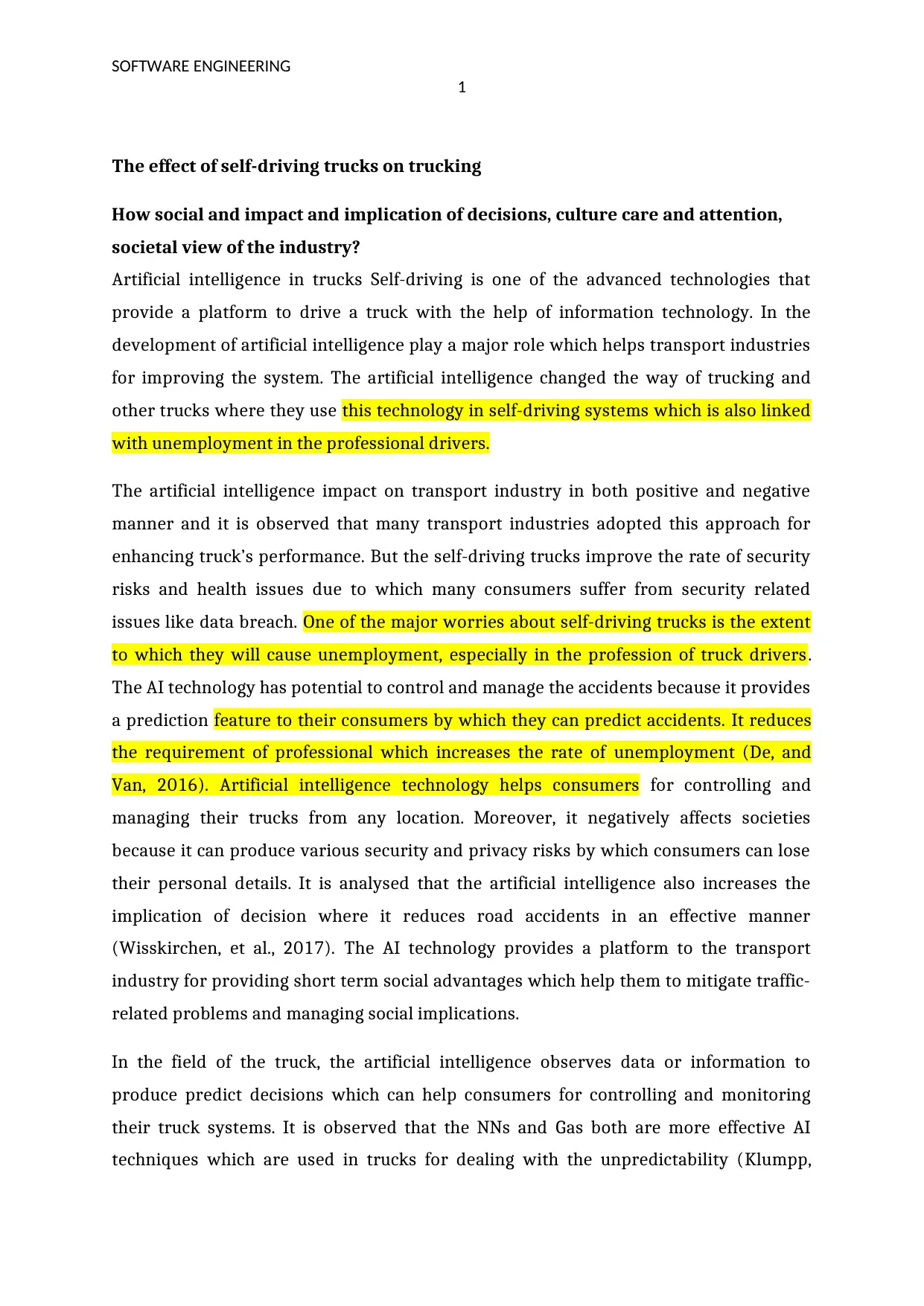
SOFTWARE ENGINEERING
1
The effect of self-driving trucks on trucking
How social and impact and implication of decisions, culture care and attention,
societal view of the industry?
Artificial intelligence in trucks Self-driving is one of the advanced technologies that
provide a platform to drive a truck with the help of information technology. In the
development of artificial intelligence play a major role which helps transport industries
for improving the system. The artificial intelligence changed the way of trucking and
other trucks where they use this technology in self-driving systems which is also linked
with unemployment in the professional drivers.
The artificial intelligence impact on transport industry in both positive and negative
manner and it is observed that many transport industries adopted this approach for
enhancing truck’s performance. But the self-driving trucks improve the rate of security
risks and health issues due to which many consumers suffer from security related
issues like data breach. One of the major worries about self-driving trucks is the extent
to which they will cause unemployment, especially in the profession of truck drivers.
The AI technology has potential to control and manage the accidents because it provides
a prediction feature to their consumers by which they can predict accidents. It reduces
the requirement of professional which increases the rate of unemployment (De, and
Van, 2016). Artificial intelligence technology helps consumers for controlling and
managing their trucks from any location. Moreover, it negatively affects societies
because it can produce various security and privacy risks by which consumers can lose
their personal details. It is analysed that the artificial intelligence also increases the
implication of decision where it reduces road accidents in an effective manner
(Wisskirchen, et al., 2017). The AI technology provides a platform to the transport
industry for providing short term social advantages which help them to mitigate traffic-
related problems and managing social implications.
In the field of the truck, the artificial intelligence observes data or information to
produce predict decisions which can help consumers for controlling and monitoring
their truck systems. It is observed that the NNs and Gas both are more effective AI
techniques which are used in trucks for dealing with the unpredictability (Klumpp,
1
The effect of self-driving trucks on trucking
How social and impact and implication of decisions, culture care and attention,
societal view of the industry?
Artificial intelligence in trucks Self-driving is one of the advanced technologies that
provide a platform to drive a truck with the help of information technology. In the
development of artificial intelligence play a major role which helps transport industries
for improving the system. The artificial intelligence changed the way of trucking and
other trucks where they use this technology in self-driving systems which is also linked
with unemployment in the professional drivers.
The artificial intelligence impact on transport industry in both positive and negative
manner and it is observed that many transport industries adopted this approach for
enhancing truck’s performance. But the self-driving trucks improve the rate of security
risks and health issues due to which many consumers suffer from security related
issues like data breach. One of the major worries about self-driving trucks is the extent
to which they will cause unemployment, especially in the profession of truck drivers.
The AI technology has potential to control and manage the accidents because it provides
a prediction feature to their consumers by which they can predict accidents. It reduces
the requirement of professional which increases the rate of unemployment (De, and
Van, 2016). Artificial intelligence technology helps consumers for controlling and
managing their trucks from any location. Moreover, it negatively affects societies
because it can produce various security and privacy risks by which consumers can lose
their personal details. It is analysed that the artificial intelligence also increases the
implication of decision where it reduces road accidents in an effective manner
(Wisskirchen, et al., 2017). The AI technology provides a platform to the transport
industry for providing short term social advantages which help them to mitigate traffic-
related problems and managing social implications.
In the field of the truck, the artificial intelligence observes data or information to
produce predict decisions which can help consumers for controlling and monitoring
their truck systems. It is observed that the NNs and Gas both are more effective AI
techniques which are used in trucks for dealing with the unpredictability (Klumpp,
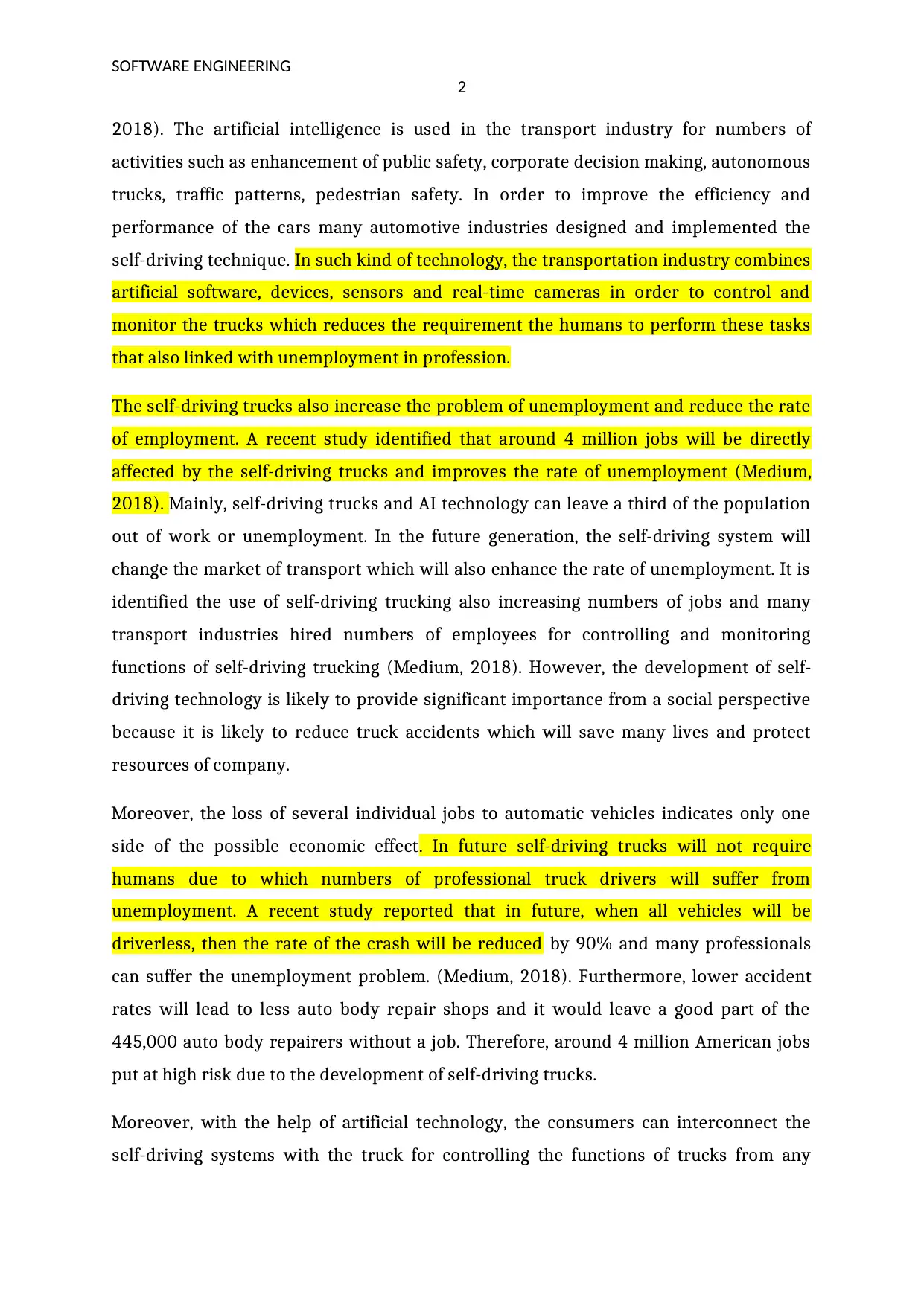
SOFTWARE ENGINEERING
2
2018). The artificial intelligence is used in the transport industry for numbers of
activities such as enhancement of public safety, corporate decision making, autonomous
trucks, traffic patterns, pedestrian safety. In order to improve the efficiency and
performance of the cars many automotive industries designed and implemented the
self-driving technique. In such kind of technology, the transportation industry combines
artificial software, devices, sensors and real-time cameras in order to control and
monitor the trucks which reduces the requirement the humans to perform these tasks
that also linked with unemployment in profession.
The self-driving trucks also increase the problem of unemployment and reduce the rate
of employment. A recent study identified that around 4 million jobs will be directly
affected by the self-driving trucks and improves the rate of unemployment (Medium,
2018). Mainly, self-driving trucks and AI technology can leave a third of the population
out of work or unemployment. In the future generation, the self-driving system will
change the market of transport which will also enhance the rate of unemployment. It is
identified the use of self-driving trucking also increasing numbers of jobs and many
transport industries hired numbers of employees for controlling and monitoring
functions of self-driving trucking (Medium, 2018). However, the development of self-
driving technology is likely to provide significant importance from a social perspective
because it is likely to reduce truck accidents which will save many lives and protect
resources of company.
Moreover, the loss of several individual jobs to automatic vehicles indicates only one
side of the possible economic effect. In future self-driving trucks will not require
humans due to which numbers of professional truck drivers will suffer from
unemployment. A recent study reported that in future, when all vehicles will be
driverless, then the rate of the crash will be reduced by 90% and many professionals
can suffer the unemployment problem. (Medium, 2018). Furthermore, lower accident
rates will lead to less auto body repair shops and it would leave a good part of the
445,000 auto body repairers without a job. Therefore, around 4 million American jobs
put at high risk due to the development of self-driving trucks.
Moreover, with the help of artificial technology, the consumers can interconnect the
self-driving systems with the truck for controlling the functions of trucks from any
2
2018). The artificial intelligence is used in the transport industry for numbers of
activities such as enhancement of public safety, corporate decision making, autonomous
trucks, traffic patterns, pedestrian safety. In order to improve the efficiency and
performance of the cars many automotive industries designed and implemented the
self-driving technique. In such kind of technology, the transportation industry combines
artificial software, devices, sensors and real-time cameras in order to control and
monitor the trucks which reduces the requirement the humans to perform these tasks
that also linked with unemployment in profession.
The self-driving trucks also increase the problem of unemployment and reduce the rate
of employment. A recent study identified that around 4 million jobs will be directly
affected by the self-driving trucks and improves the rate of unemployment (Medium,
2018). Mainly, self-driving trucks and AI technology can leave a third of the population
out of work or unemployment. In the future generation, the self-driving system will
change the market of transport which will also enhance the rate of unemployment. It is
identified the use of self-driving trucking also increasing numbers of jobs and many
transport industries hired numbers of employees for controlling and monitoring
functions of self-driving trucking (Medium, 2018). However, the development of self-
driving technology is likely to provide significant importance from a social perspective
because it is likely to reduce truck accidents which will save many lives and protect
resources of company.
Moreover, the loss of several individual jobs to automatic vehicles indicates only one
side of the possible economic effect. In future self-driving trucks will not require
humans due to which numbers of professional truck drivers will suffer from
unemployment. A recent study reported that in future, when all vehicles will be
driverless, then the rate of the crash will be reduced by 90% and many professionals
can suffer the unemployment problem. (Medium, 2018). Furthermore, lower accident
rates will lead to less auto body repair shops and it would leave a good part of the
445,000 auto body repairers without a job. Therefore, around 4 million American jobs
put at high risk due to the development of self-driving trucks.
Moreover, with the help of artificial technology, the consumers can interconnect the
self-driving systems with the truck for controlling the functions of trucks from any
⊘ This is a preview!⊘
Do you want full access?
Subscribe today to unlock all pages.

Trusted by 1+ million students worldwide
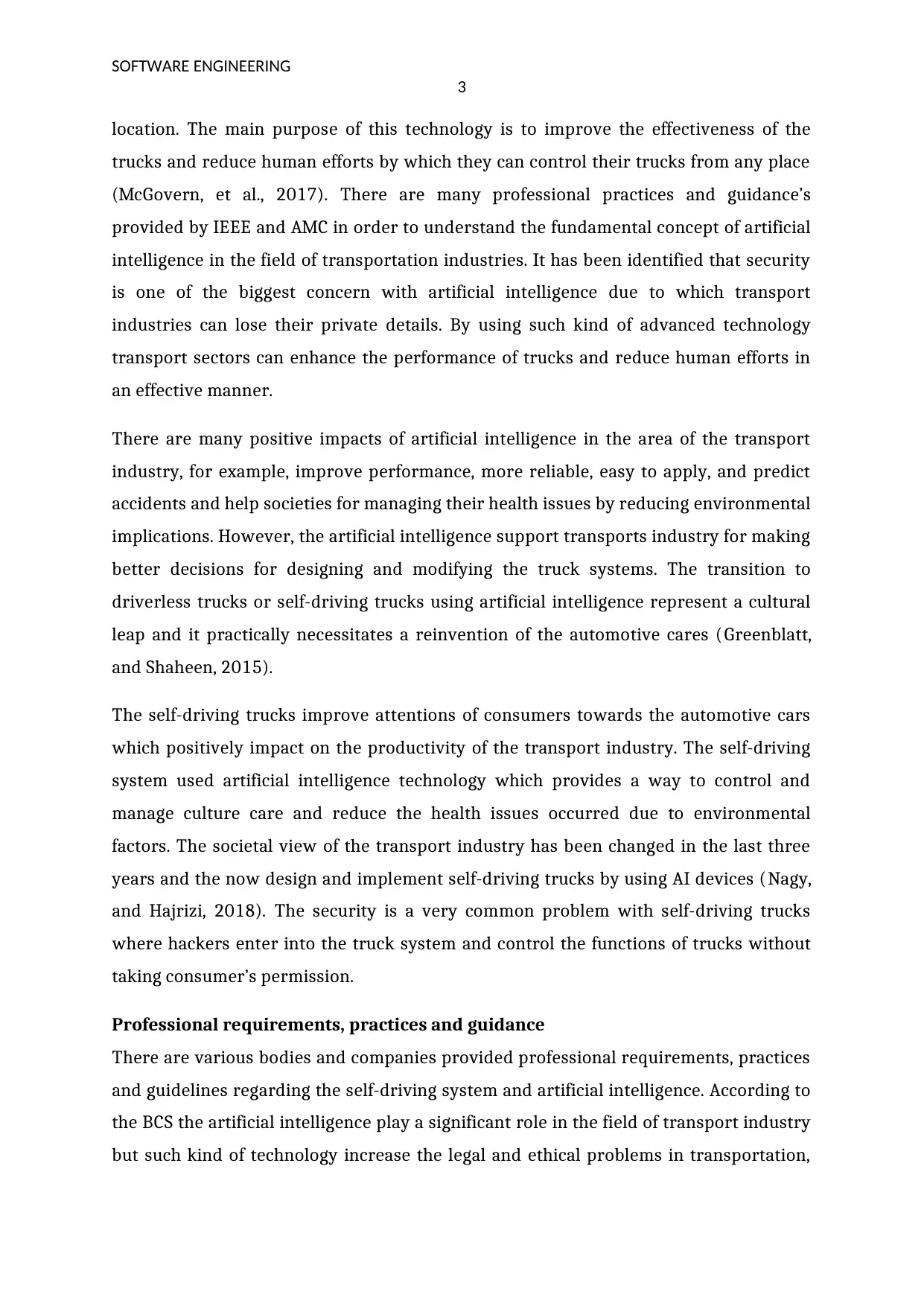
SOFTWARE ENGINEERING
3
location. The main purpose of this technology is to improve the effectiveness of the
trucks and reduce human efforts by which they can control their trucks from any place
(McGovern, et al., 2017). There are many professional practices and guidance’s
provided by IEEE and AMC in order to understand the fundamental concept of artificial
intelligence in the field of transportation industries. It has been identified that security
is one of the biggest concern with artificial intelligence due to which transport
industries can lose their private details. By using such kind of advanced technology
transport sectors can enhance the performance of trucks and reduce human efforts in
an effective manner.
There are many positive impacts of artificial intelligence in the area of the transport
industry, for example, improve performance, more reliable, easy to apply, and predict
accidents and help societies for managing their health issues by reducing environmental
implications. However, the artificial intelligence support transports industry for making
better decisions for designing and modifying the truck systems. The transition to
driverless trucks or self-driving trucks using artificial intelligence represent a cultural
leap and it practically necessitates a reinvention of the automotive cares (Greenblatt,
and Shaheen, 2015).
The self-driving trucks improve attentions of consumers towards the automotive cars
which positively impact on the productivity of the transport industry. The self-driving
system used artificial intelligence technology which provides a way to control and
manage culture care and reduce the health issues occurred due to environmental
factors. The societal view of the transport industry has been changed in the last three
years and the now design and implement self-driving trucks by using AI devices (Nagy,
and Hajrizi, 2018). The security is a very common problem with self-driving trucks
where hackers enter into the truck system and control the functions of trucks without
taking consumer’s permission.
Professional requirements, practices and guidance
There are various bodies and companies provided professional requirements, practices
and guidelines regarding the self-driving system and artificial intelligence. According to
the BCS the artificial intelligence play a significant role in the field of transport industry
but such kind of technology increase the legal and ethical problems in transportation,
3
location. The main purpose of this technology is to improve the effectiveness of the
trucks and reduce human efforts by which they can control their trucks from any place
(McGovern, et al., 2017). There are many professional practices and guidance’s
provided by IEEE and AMC in order to understand the fundamental concept of artificial
intelligence in the field of transportation industries. It has been identified that security
is one of the biggest concern with artificial intelligence due to which transport
industries can lose their private details. By using such kind of advanced technology
transport sectors can enhance the performance of trucks and reduce human efforts in
an effective manner.
There are many positive impacts of artificial intelligence in the area of the transport
industry, for example, improve performance, more reliable, easy to apply, and predict
accidents and help societies for managing their health issues by reducing environmental
implications. However, the artificial intelligence support transports industry for making
better decisions for designing and modifying the truck systems. The transition to
driverless trucks or self-driving trucks using artificial intelligence represent a cultural
leap and it practically necessitates a reinvention of the automotive cares (Greenblatt,
and Shaheen, 2015).
The self-driving trucks improve attentions of consumers towards the automotive cars
which positively impact on the productivity of the transport industry. The self-driving
system used artificial intelligence technology which provides a way to control and
manage culture care and reduce the health issues occurred due to environmental
factors. The societal view of the transport industry has been changed in the last three
years and the now design and implement self-driving trucks by using AI devices (Nagy,
and Hajrizi, 2018). The security is a very common problem with self-driving trucks
where hackers enter into the truck system and control the functions of trucks without
taking consumer’s permission.
Professional requirements, practices and guidance
There are various bodies and companies provided professional requirements, practices
and guidelines regarding the self-driving system and artificial intelligence. According to
the BCS the artificial intelligence play a significant role in the field of transport industry
but such kind of technology increase the legal and ethical problems in transportation,
Paraphrase This Document
Need a fresh take? Get an instant paraphrase of this document with our AI Paraphraser
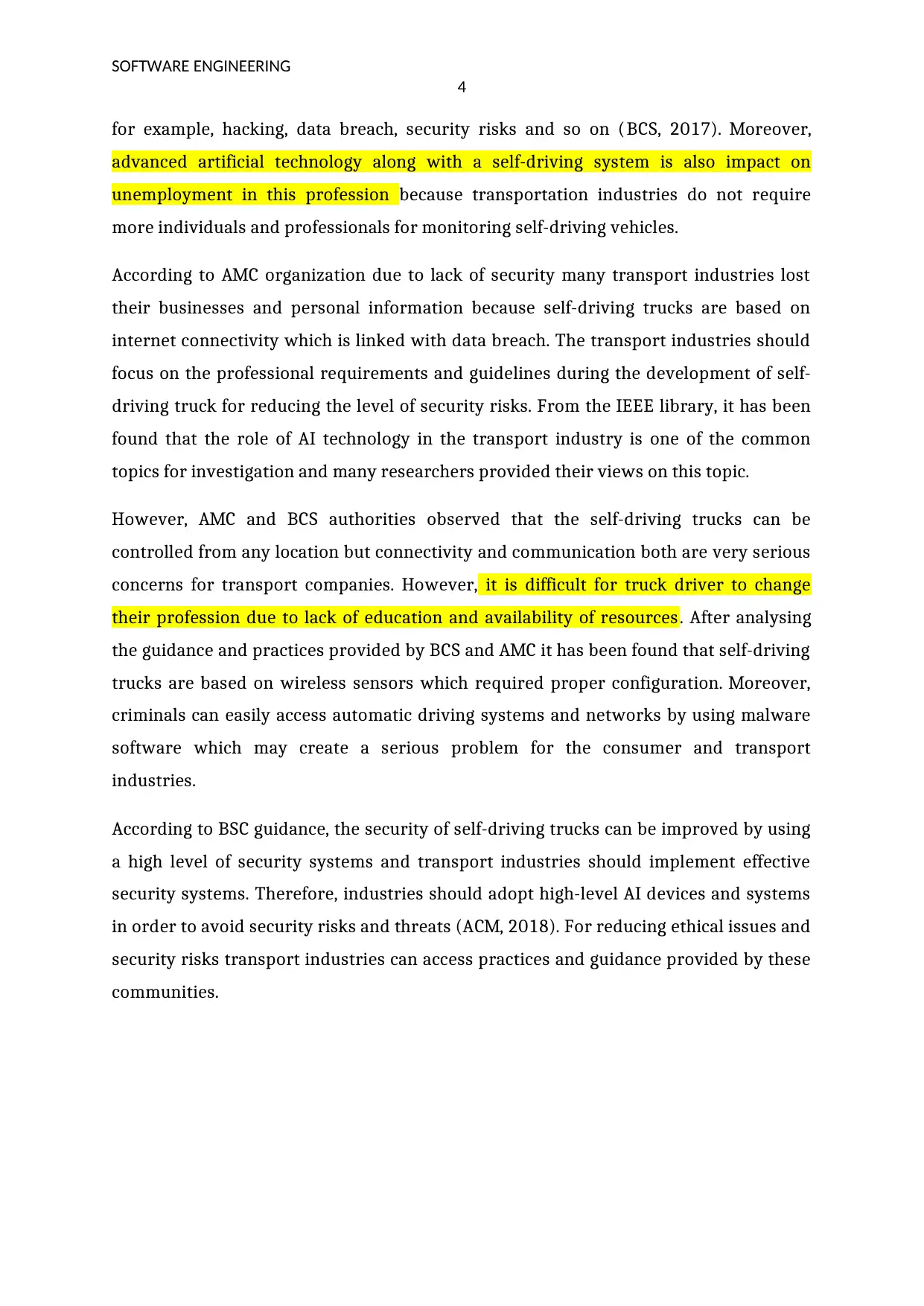
SOFTWARE ENGINEERING
4
for example, hacking, data breach, security risks and so on (BCS, 2017). Moreover,
advanced artificial technology along with a self-driving system is also impact on
unemployment in this profession because transportation industries do not require
more individuals and professionals for monitoring self-driving vehicles.
According to AMC organization due to lack of security many transport industries lost
their businesses and personal information because self-driving trucks are based on
internet connectivity which is linked with data breach. The transport industries should
focus on the professional requirements and guidelines during the development of self-
driving truck for reducing the level of security risks. From the IEEE library, it has been
found that the role of AI technology in the transport industry is one of the common
topics for investigation and many researchers provided their views on this topic.
However, AMC and BCS authorities observed that the self-driving trucks can be
controlled from any location but connectivity and communication both are very serious
concerns for transport companies. However, it is difficult for truck driver to change
their profession due to lack of education and availability of resources. After analysing
the guidance and practices provided by BCS and AMC it has been found that self-driving
trucks are based on wireless sensors which required proper configuration. Moreover,
criminals can easily access automatic driving systems and networks by using malware
software which may create a serious problem for the consumer and transport
industries.
According to BSC guidance, the security of self-driving trucks can be improved by using
a high level of security systems and transport industries should implement effective
security systems. Therefore, industries should adopt high-level AI devices and systems
in order to avoid security risks and threats (ACM, 2018). For reducing ethical issues and
security risks transport industries can access practices and guidance provided by these
communities.
4
for example, hacking, data breach, security risks and so on (BCS, 2017). Moreover,
advanced artificial technology along with a self-driving system is also impact on
unemployment in this profession because transportation industries do not require
more individuals and professionals for monitoring self-driving vehicles.
According to AMC organization due to lack of security many transport industries lost
their businesses and personal information because self-driving trucks are based on
internet connectivity which is linked with data breach. The transport industries should
focus on the professional requirements and guidelines during the development of self-
driving truck for reducing the level of security risks. From the IEEE library, it has been
found that the role of AI technology in the transport industry is one of the common
topics for investigation and many researchers provided their views on this topic.
However, AMC and BCS authorities observed that the self-driving trucks can be
controlled from any location but connectivity and communication both are very serious
concerns for transport companies. However, it is difficult for truck driver to change
their profession due to lack of education and availability of resources. After analysing
the guidance and practices provided by BCS and AMC it has been found that self-driving
trucks are based on wireless sensors which required proper configuration. Moreover,
criminals can easily access automatic driving systems and networks by using malware
software which may create a serious problem for the consumer and transport
industries.
According to BSC guidance, the security of self-driving trucks can be improved by using
a high level of security systems and transport industries should implement effective
security systems. Therefore, industries should adopt high-level AI devices and systems
in order to avoid security risks and threats (ACM, 2018). For reducing ethical issues and
security risks transport industries can access practices and guidance provided by these
communities.
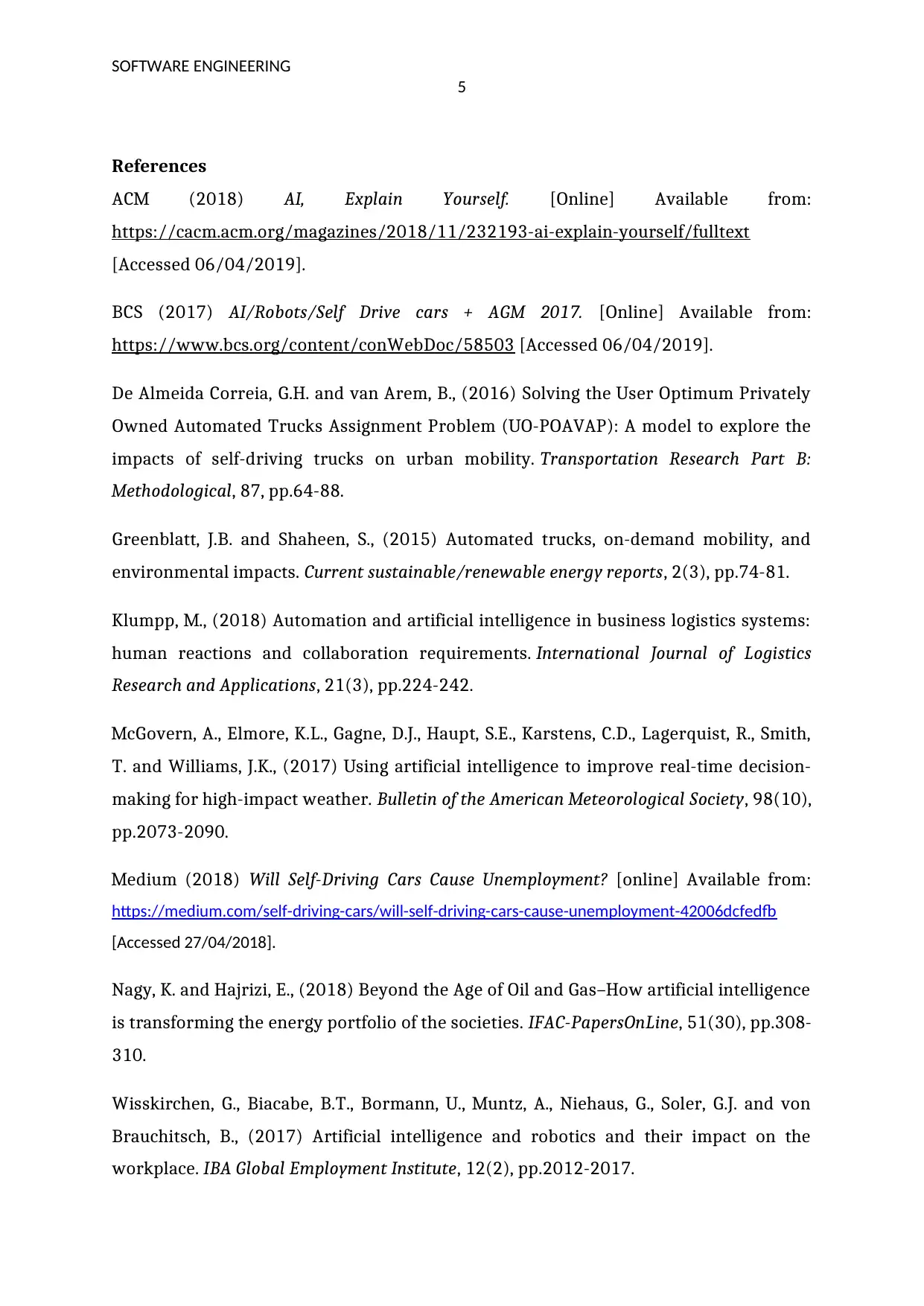
SOFTWARE ENGINEERING
5
References
ACM (2018) AI, Explain Yourself. [Online] Available from:
https://cacm.acm.org/magazines/2018/11/232193-ai-explain-yourself/fulltext
[Accessed 06/04/2019].
BCS (2017) AI/Robots/Self Drive cars + AGM 2017. [Online] Available from:
https://www.bcs.org/content/conWebDoc/58503 [Accessed 06/04/2019].
De Almeida Correia, G.H. and van Arem, B., (2016) Solving the User Optimum Privately
Owned Automated Trucks Assignment Problem (UO-POAVAP): A model to explore the
impacts of self-driving trucks on urban mobility. Transportation Research Part B:
Methodological, 87, pp.64-88.
Greenblatt, J.B. and Shaheen, S., (2015) Automated trucks, on-demand mobility, and
environmental impacts. Current sustainable/renewable energy reports, 2(3), pp.74-81.
Klumpp, M., (2018) Automation and artificial intelligence in business logistics systems:
human reactions and collaboration requirements. International Journal of Logistics
Research and Applications, 21(3), pp.224-242.
McGovern, A., Elmore, K.L., Gagne, D.J., Haupt, S.E., Karstens, C.D., Lagerquist, R., Smith,
T. and Williams, J.K., (2017) Using artificial intelligence to improve real-time decision-
making for high-impact weather. Bulletin of the American Meteorological Society, 98(10),
pp.2073-2090.
Medium (2018) Will Self-Driving Cars Cause Unemployment? [online] Available from:
https://medium.com/self-driving-cars/will-self-driving-cars-cause-unemployment-42006dcfedfb
[Accessed 27/04/2018].
Nagy, K. and Hajrizi, E., (2018) Beyond the Age of Oil and Gas–How artificial intelligence
is transforming the energy portfolio of the societies. IFAC-PapersOnLine, 51(30), pp.308-
310.
Wisskirchen, G., Biacabe, B.T., Bormann, U., Muntz, A., Niehaus, G., Soler, G.J. and von
Brauchitsch, B., (2017) Artificial intelligence and robotics and their impact on the
workplace. IBA Global Employment Institute, 12(2), pp.2012-2017.
5
References
ACM (2018) AI, Explain Yourself. [Online] Available from:
https://cacm.acm.org/magazines/2018/11/232193-ai-explain-yourself/fulltext
[Accessed 06/04/2019].
BCS (2017) AI/Robots/Self Drive cars + AGM 2017. [Online] Available from:
https://www.bcs.org/content/conWebDoc/58503 [Accessed 06/04/2019].
De Almeida Correia, G.H. and van Arem, B., (2016) Solving the User Optimum Privately
Owned Automated Trucks Assignment Problem (UO-POAVAP): A model to explore the
impacts of self-driving trucks on urban mobility. Transportation Research Part B:
Methodological, 87, pp.64-88.
Greenblatt, J.B. and Shaheen, S., (2015) Automated trucks, on-demand mobility, and
environmental impacts. Current sustainable/renewable energy reports, 2(3), pp.74-81.
Klumpp, M., (2018) Automation and artificial intelligence in business logistics systems:
human reactions and collaboration requirements. International Journal of Logistics
Research and Applications, 21(3), pp.224-242.
McGovern, A., Elmore, K.L., Gagne, D.J., Haupt, S.E., Karstens, C.D., Lagerquist, R., Smith,
T. and Williams, J.K., (2017) Using artificial intelligence to improve real-time decision-
making for high-impact weather. Bulletin of the American Meteorological Society, 98(10),
pp.2073-2090.
Medium (2018) Will Self-Driving Cars Cause Unemployment? [online] Available from:
https://medium.com/self-driving-cars/will-self-driving-cars-cause-unemployment-42006dcfedfb
[Accessed 27/04/2018].
Nagy, K. and Hajrizi, E., (2018) Beyond the Age of Oil and Gas–How artificial intelligence
is transforming the energy portfolio of the societies. IFAC-PapersOnLine, 51(30), pp.308-
310.
Wisskirchen, G., Biacabe, B.T., Bormann, U., Muntz, A., Niehaus, G., Soler, G.J. and von
Brauchitsch, B., (2017) Artificial intelligence and robotics and their impact on the
workplace. IBA Global Employment Institute, 12(2), pp.2012-2017.
⊘ This is a preview!⊘
Do you want full access?
Subscribe today to unlock all pages.

Trusted by 1+ million students worldwide
1 out of 6
Related Documents
Your All-in-One AI-Powered Toolkit for Academic Success.
+13062052269
info@desklib.com
Available 24*7 on WhatsApp / Email
![[object Object]](/_next/static/media/star-bottom.7253800d.svg)
Unlock your academic potential
Copyright © 2020–2026 A2Z Services. All Rights Reserved. Developed and managed by ZUCOL.





